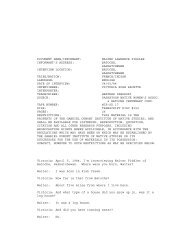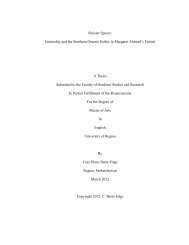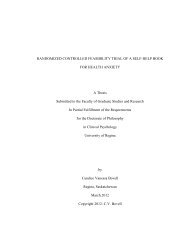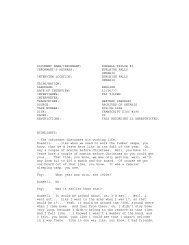Icon - DSpace - University of Regina
Icon - DSpace - University of Regina
Icon - DSpace - University of Regina
You also want an ePaper? Increase the reach of your titles
YUMPU automatically turns print PDFs into web optimized ePapers that Google loves.
photographer <strong>of</strong> the moving image, influenced the<br />
concept.<br />
Hamilton's original ceramic floor design will be<br />
installed in the main concourse area <strong>of</strong> the CKHS. The<br />
design embodies the spirit <strong>of</strong> the facility, representing a<br />
game plan or strategy that could be applied to any<br />
number <strong>of</strong> the athletic events that will take place in the<br />
building. Work on the new buildings will be completed<br />
this August. The artistic installations will be unveiled at<br />
the <strong>of</strong>ficial opening <strong>of</strong> the buildings following the<br />
completion <strong>of</strong> construction.<br />
Visualization s<strong>of</strong>tware wins second<br />
annual Award <strong>of</strong> Innovation<br />
<strong>University</strong> <strong>of</strong> <strong>Regina</strong> engineering pr<strong>of</strong>essor Luigi<br />
Benedicenti and Jeffrey Mahovsky BASc’99, CCSc’99,<br />
MASc’01, a former U <strong>of</strong> R student who is currently a<br />
PhD candidate at the <strong>University</strong> <strong>of</strong> Calgary, are the<br />
recipients <strong>of</strong> the second annual Award <strong>of</strong> Innovation<br />
presented at the <strong>Regina</strong> Chamber <strong>of</strong> Commerce's<br />
Paragon Awards banquet on April 1.<br />
Benedicenti and Mahovsky won the award for their<br />
Distributed Visualization System (DVS) s<strong>of</strong>tware which<br />
converts data into visual forms. The s<strong>of</strong>tware was first<br />
developed while Mahovsky was a master's student in<br />
engineering. Benedicenti, who leads the project to<br />
develop DVS's commercial potential, says it can be<br />
applied to a wide variety <strong>of</strong> applications from simulating<br />
and modeling <strong>of</strong> geological sites (for petroleum reservoir<br />
simulation, for example), to medical imaging, to<br />
electronic games.<br />
The project is co-sponsored by TRLabs (<strong>Regina</strong>), a<br />
pre-competitive research venture funded by industrial<br />
and government sponsors. TRLabs is an information<br />
technology research consortium <strong>of</strong> universities,<br />
government and industry in Canada that supports<br />
graduate students and information technology, and new<br />
media research at the U <strong>of</strong> R.<br />
The Award <strong>of</strong> Innovation, administered through the<br />
<strong>University</strong>-Industry Liaison Office, and sponsored by the<br />
<strong>Regina</strong> Research Park, rewards and promotes the efforts<br />
<strong>of</strong> researchers involved in the commercialization <strong>of</strong> their<br />
research.<br />
Luigi Benedicenti (L) and former U <strong>of</strong> R student Jeffrey<br />
Mahovsky accept the second annual Award <strong>of</strong> Innovation at<br />
an April 1 ceremony.<br />
President’s Message<br />
On April 8 the <strong>University</strong> and the<br />
Francophone community celebrated<br />
the culmination <strong>of</strong> years <strong>of</strong> effort<br />
with the <strong>of</strong>ficial opening <strong>of</strong> the Institut<br />
français, a unique French post-secondary<br />
education centre that <strong>of</strong>fers language,<br />
cultural, and social programs at the<br />
<strong>University</strong> <strong>of</strong> <strong>Regina</strong>. I am particularly<br />
proud <strong>of</strong> the excellent relationship<br />
established between the <strong>University</strong> and<br />
the Francophone community <strong>of</strong><br />
Saskatchewan as the Institut français has<br />
developed. Together we have met major<br />
challenges and, in doing so, have<br />
strengthened the connections between<br />
the <strong>University</strong> and community.<br />
The <strong>University</strong> is strongly committed<br />
to supporting and expanding the effective use <strong>of</strong> Canada's<br />
two <strong>of</strong>ficial languages. In addition to the Institut français,<br />
this commitment is evident in the work <strong>of</strong> the French<br />
Department in the Faculty <strong>of</strong> Arts, as well as in the Faculty<br />
<strong>of</strong> Education's Baccaulauréat en éducation program which is<br />
tailored to meet the needs <strong>of</strong> students wishing to teach in<br />
Francophone and French immersion schools.<br />
Canada's two <strong>of</strong>ficial languages are important to<br />
Canadians. The establishment <strong>of</strong> the Institut français and<br />
the ongoing work <strong>of</strong> our colleagues in the Department <strong>of</strong><br />
French and Faculty <strong>of</strong> Education demonstrate that<br />
supporting both <strong>of</strong>ficial languages is, and will continue to<br />
be, important to the <strong>University</strong> <strong>of</strong> <strong>Regina</strong>.<br />
The Centre for Research and Information on Canada<br />
(CRIC) has just published Bilingualism: Part <strong>of</strong> Our Past or<br />
Part <strong>of</strong> Our Future?, a report on Canadian attitudes on<br />
bilingualism. The study's findings bode well for narrowing<br />
the gap between Canadians' support for <strong>of</strong>ficial bilingualism<br />
and their desire to learn the other <strong>of</strong>ficial language, on one<br />
hand, and the actual extent <strong>of</strong> English-French bilingualism<br />
on the other. The CRIC survey also reports that those whose<br />
first language is not French or English are overwhelmingly<br />
supportive <strong>of</strong> learning both <strong>of</strong>ficial languages.<br />
Recently I attended an Office <strong>of</strong> the Commissioner <strong>of</strong><br />
Official Languages' symposium, Vision and Challenges for<br />
the 21st Century. The symposium brought together<br />
stakeholders from various sectors <strong>of</strong> Canadian society to<br />
discuss issues and propose solutions to one <strong>of</strong> the<br />
objectives <strong>of</strong> the federal government's Action Plan for<br />
Official Languages, namely, doubling the number <strong>of</strong> young<br />
Canadians with a working knowledge <strong>of</strong> both <strong>of</strong>ficial<br />
languages in the next 10 years. It is indeed exciting to be<br />
part <strong>of</strong> the group providing counsel on these matters.<br />
Language is a remarkable aspect <strong>of</strong> our human<br />
experience. Learning a language gives access to the culture<br />
<strong>of</strong> the speakers <strong>of</strong> that language – what they think, and<br />
how they express their thoughts – and can also provide<br />
larger prospects and opportunities for employment and<br />
service.<br />
The establishment <strong>of</strong> the Institut français is a positive<br />
reflection <strong>of</strong> the linguistic duality <strong>of</strong> this country. At the<br />
same time, the Institut français provides an exciting new<br />
venue to explore Francophone culture and positions the U<br />
<strong>of</strong> R as a focal point for French-language education in<br />
Saskatchewan.<br />
David T. Barnard<br />
PRESIDENT<br />
Spring 2004 THE THIRD DEGREE 3










